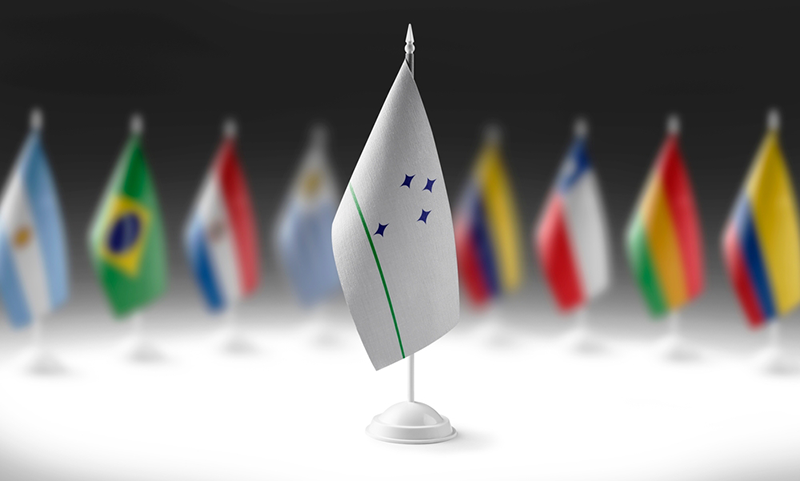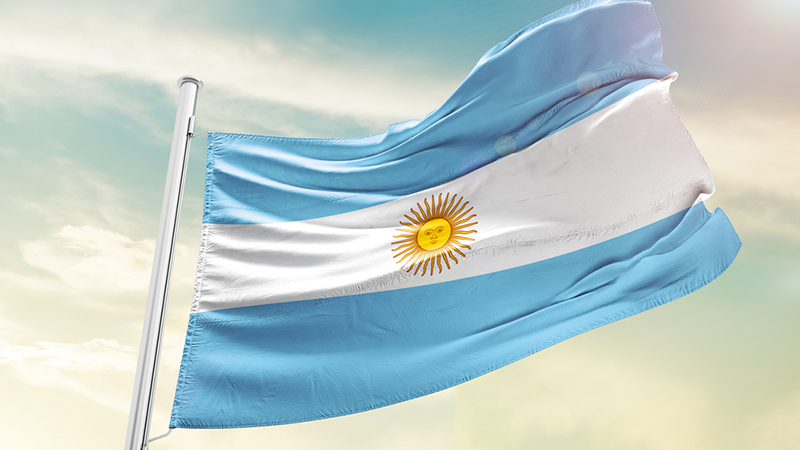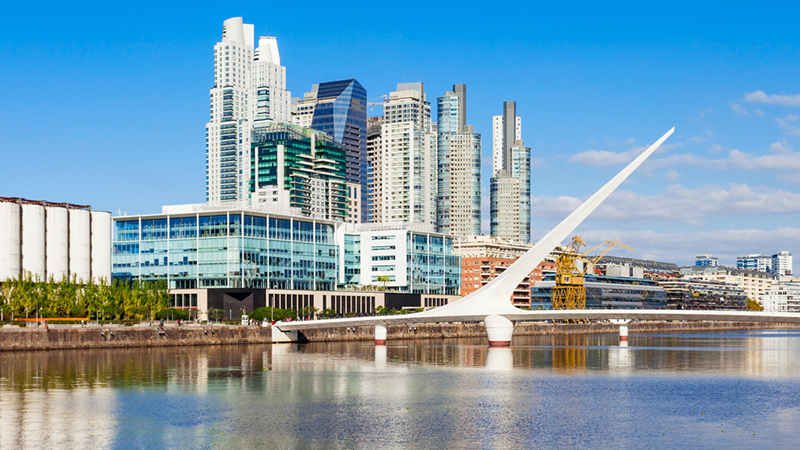Doing Business in Argentina
Argentina offers vast opportunities for foreign investors across sectors such as natural resources, energy, finance, infrastructure, and tourism....
6 min read
 H&CO
Sep 9, 2025 9:44:10 AM
H&CO
Sep 9, 2025 9:44:10 AM

Thirty-four years after its creation, Mercosur has consolidated an expanded market of more than 260 million people, with benefits that transcend trade. The regional bloc generates competitive advantages for companies and opens spaces for cooperation among its affiliated and associated members, such as Colombia.
The Southern Common Market (Mercosur in Spanish) was created in 1991 by the countries that signed the Treaty of Asunción for their economic and commercial integration.
Essentially, the process of economic integration involves the free movement of goods, services, and productive factors among its members. It also establishes a common policy toward other countries outside the treaty.
Furthermore, within the framework of this agreement, the mobility of people with respect to travel documents or temporary residences is facilitated. Integration is also promoted in education, cultural industries, and human rights. It also promotes the exchange of experiences related to citizen security, transnational organized crime, and training in these areas.
If you're pursuing a commercial initiative that you want to scale internationally, you might be interested in this review of the treaty's main benefits.
The Mercosur member states are Argentina, Brazil, Paraguay, and Uruguay. The Bolivarian Republic of Venezuela has also been a member since its inception. However, it has been suspended since August 2017 due to a clause in the Ushuaia Protocol (1998) on Democratic Commitment.
Mercosur also has associate states, namely Chile, Colombia, Ecuador, Guyana, Peru, Suriname, and Bolivia. It should be noted that Bolivia is in the process of accession and does not yet have all the rights and obligations of the other members. Furthermore, in December 2024, the Republic of Panama requested to join as an Associate State.
Colombia, as an Associate State, has actively participated in technical and specialized meetings, particularly those held during the Pro Tempore Presidencies of Uruguay (second half of 2024) and Argentina (first half of 2025). These meetings addressed key topics related to drugs, migration, democracy, social development, risk management, and digital inclusion, among others.
The Colombian National Coordination Office for MERCOSUR actively participates in the Forum for Consultation and Political Coordination (FCCP). This is the main forum for coordinating the bloc's political agenda, presenting proposals, and making decisions aimed at strengthening its institutions.
The States Parties undertake to harmonize their legislation with the following objectives:
• The free movement of goods, services and productive factors among its Member States. In practice, this is implemented through the elimination of customs duties and non-tariff restrictions.
• The adoption of a common trade policy, primarily concerning third countries. This includes the establishment of a common external tariff and the coordination of positions in economic and trade forums in Latin America and around the world.
• The coordination of macroeconomic and sectoral policies for the competitiveness of the Member States. This covers various sectors of foreign trade, such as agriculture and industry. It also includes fiscal, monetary, exchange, and capital aspects. It affects customs services, logistics, transportation, and communications.
The treaty that gave rise to Mercosur was later supplemented by the Ouro Preto Protocol. It was signed at the 7th Summit of Presidents in Ouro Preto, Brazil, in 1994.
The protocol granted Mercosur international legal personality, granting it the power to negotiate and sign agreements with third countries, economic blocs, and international organizations. It thus assumed the status of an international organization, whose ownership is exercised by the Common Market Council.
Thus, the institutional structure was composed of three decision-making bodies: the Common Market Council, the Common Market Group, and the Trade Commission. In addition, there are three representative and advisory bodies: the Joint Parliamentary Commission (currently the Mercosur Parliament), the Economic-Social Consultative Forum, and the Administrative Secretariat.
Article 46 established the official languages (Portuguese and Spanish), with Guaraní being added in 2006.
The Common Market's rules were also established as binding on the Member States, along with a procedure for their incorporation into national legal systems.
Regarding the common external tariff, the foundations of an imperfect customs union were established. The union entered into force on January 1, 1995.
Before signing the protocol, each state defined which products would have tariffs within Mercosur. Two sectors were excluded: sugar and the automotive industry. A working group was then formed to resolve differences between the states.
The "need for special consideration for less developed countries and regions" was also recognized.
The Ouro Preto Protocol entered into force on December 15, 1995.
The highest decision-making body is the Presidents' Summit. Mercosur also has the Common Market Council (CMC), the Common Market Group (GMC), and the Mercosur Trade Commission (CCM).
Independent of these bodies, the Member States also hold Sectoral Ministerial Meetings. There are also governing bodies, such as the General Secretariat, the Mercosur Parliament, the Economic and Social Consultative Forum, and the Permanent Review Tribunal.
The Pro Tempore Presidency (PPT) rotates every six months in alphabetical order among the Member States. It is transferred during presidential summits.
The bloc has other highly relevant instruments for its operation. The Mercosur Structural Convergence Fund (FOCEM) promotes structural convergence, develops competitiveness, fosters social cohesion, and strengthens the institutional structure. Likewise, the Mercosur Social Institute (ISM) is a technical research institution in the field of social policies.
>> You may also be interested in how to open a business in Colombia.
Thirty-four years ago, the bloc was born as a platform to position and integrate regional economies into the world. In this context, Colombia—as an Associate State—has taken advantage of its integration to strengthen ties with Argentina, Brazil, Uruguay, and Paraguay, even though it is not a full member.
Mercosur has created a vast market of more than 260 million people, with a Common External Tariff, which has boosted intra-bloc trade.
Colombia signed economic complementarity agreements (ACE No. 59 in 2004 and No. 72 in 2017), obtaining tariff preferences for exports to the region. These agreements facilitate access to Southern Cone markets for Colombian products and enable the integration of regional value chains.
The creation of the FOCEM represented the bloc's first self-financing mechanism, designed to reduce regional asymmetries. With non-reimbursable contributions (up to 85% of the cost), it finances infrastructure and social investment projects.
Thanks to FOCEM, for example, electrical interconnections, sewage treatment plants, and cross-border social housing have been built. Although Colombia does not directly receive the funds (as it is an associate, not a member), it indirectly benefits from the bloc's greater logistics and energy integration.
Mercosur is also making progress in social and cultural integration. Agreements exist to facilitate the mobility of people. These include temporary residency and special travel documents that allow citizens to travel and live in member countries with ease.
In education, the mutual validation of university degrees is promoted. The ARCU-SUR regional accreditation system supports university programs, and the MARCA Program encourages academic exchanges for regionally accredited degrees. For example, Colombian universities participate in MARCA projects alongside their Mercosur counterparts, facilitating internships and mobility for students and professors. These initiatives strengthen cultural and academic ties with the Southern Cone.
Mercosur's social focus is also evident in projects funded by FOCEM. For example, projects such as water and sanitation, access to decent housing, and infrastructure improvements in disadvantaged communities. Low-income housing developments and drinking water systems in rural areas were also funded, reducing social gaps.
Thus, integration has allowed Colombia to participate in regional social cooperation programs and take advantage of mobility and professional training opportunities within the Mercosur network.
Politically, the treaty promoted solid institutional mechanisms. It created democratic protocols (Ushuaia 1998 and 2011), established the Mercosur Parliament, dispute resolution tribunals, and an Economic and Social Consultative Forum. This has given the bloc greater legitimacy and political stability.
In this regard, Colombia actively participates in Mercosur meetings to which it is invited. Under the pro tempore presidencies of Uruguay and Argentina, it had a prominent presence at sectoral technical meetings. There, it addressed issues of common interest such as the fight against drugs, migration, democracy, and social development.
Likewise, Colombia's National Coordination Office for Mercosur participates in the Forum for Consultation and Political Coordination (FCCP). This is the main body for coordinating the bloc's political agenda, allowing it to present proposals and strengthen its institutional framework.
On the diplomatic front, integrating the Mercosur agenda has helped Colombia articulate joint positions in multilateral forums and share regional best practices.
After three decades of regional integration, Mercosur is at a turning point that will shape its medium-term prospects. The regional bloc has consolidated an expanded market and a common external tariff that favors intraregional dynamics. Over the next five years, it plans to expand this base and extend it toward global trade. This is a major challenge, given the context marked by geopolitical tensions and digital transformation.
One of the most relevant prospects will be the possibility of deepening economic complementarity agreements with extraregional partners. Negotiations with the European Union, Singapore, EFTA, and potentially with Asia-Pacific countries could open doors to new export destinations. For SMEs, this translates into preferential access to high-consumption markets. It even entails the possibility of integrating into regional and global value chains, with greater predictability in trade rules.
The bloc is working on digitalization and customs simplification initiatives, key to reducing logistics costs and export times. Progress in electronic single windows and interoperable systems among Member States will allow businesses to operate with greater agility and competitiveness. These developments, along with the harmonization of technical standards, are strategic for expanding export offerings.
Agribusiness, the automotive industry, energy, and knowledge-based services are emerging as drivers of regional expansion. Over the next five years, cross-border investments and greater complementarity between countries are expected to increase. For medium-sized companies, this scenario opens up the opportunity to internationalize through alliances, joint ventures, or suppliers integrated into regional supply chains.
Mercosur faces the challenge of reducing internal asymmetries and generating greater trade flexibility. This is especially relevant given the demand from some partners to enable bilateral agreements outside the bloc. Strengthening the Structural Convergence Fund (FOCEM) and new financing lines could boost infrastructure and logistics projects, boosting overall competitiveness.
Mercosur has the opportunity to establish itself as a true commercial springboard to the world. Entrepreneurs and SMEs will need to be vigilant to take advantage of the agreements reached. Adapting to new logistical and digital demands and connecting to regional production networks will be key to private development.
In this context, Colombia has a strategic role as an Associate State. Its active participation in political, technical, and trade forums opens the door to deeper integration into the Southern Cone's value chains.
The next five years will make a difference. Will Mercosur continue with the logic of an expanded market? Or will it leap to help internationalize the region's companies?

Argentina offers vast opportunities for foreign investors across sectors such as natural resources, energy, finance, infrastructure, and tourism....

Brazilian labor law is governed by the Consolidação das Leis do Trabalho (CLT), a federal statute (1943) incorporating constitutional work rights,...

Opening a business in Argentina represents a strategic opportunity for foreign investors looking to expand their operations in Latin America. The...